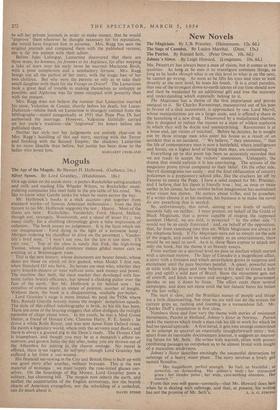The Lantartine Ladies. By Laura M. Ragg. (Macdonald. 16s.)
The first, Alix des Roys, was a good energetic mother and a `uarlst of great sensibility. Her son's writing is in most respects 2111Y the fulfilment of what she might have written if she had been born a man and had not been forced to spend most of her time .w°rrYing about the debts and idleness of Alphonse and the suitors `Ind dowries of her five daughters. She tried her best to make '11 man out of her only son--when he was twenty-two and .away r°111 home she took Emile and La Nouvelle Haase out of his study hburnt them; of the latter she thought that it • 'not only unbalances
to sell her private journals in order to make money, that he would `improve' them wherever he thought necessary for his reputation, she would have forgiven him in advance. Mrs. Ragg has seen the original journals and compared them with the published version; she is far too patient with their editor.
Before Jules Laforgue, Lamartine discovered that there are three sexes, les howl:es, les femmes et les Anglaises, for after weeping a lake of tears over his early loves he married- Marianne. Birch, with a poor complexion and a satisfactory fortune. Mrs. Ragg brings out all the pathos of her story, with the tragic loss of her two children. But why were the parents so silly as to take their small daughter with them for the Voyage en Orient? The Lamartines took a great deal of trouble in making themselves as unhappy as possible, and Alphonse was far more occupied with posterity than with the present.
Mrs. Ragg does not believe the rumour that Lamartine married his niece, Valentine de Cessiat, shortly before his death, but Lucas- Dubreton—whose book on Lamartine is strangely omitted from the bibliography—stated categorically in 1951 that Pope Pius IX had authorised the marriage. However, Valentine faithfully carried on her uncle's tradition—she `improved' his letters before she published them.
Neither her style nor her judgements are entirely clear-cut in Mrs. Ragg's handling of this sad story, starting with the Terror and finishing with the Second Empire; the shadowy Lamartine is no more likeable than before, but justice has been done to the ladies who loved him. MARGARET CROSLAND



































 Previous page
Previous page